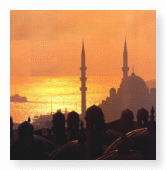|
|
 |
About
Istanbul
|
About Cappadocia
|
About Ephesus |
 Turkey is a huge, geographically and
culturally diverse country, sharing borders
with Greece, Bulgaria, Georgia, Armenia,
Nakhitchevan, Iran, Iraq and Syria. It has
almost 8,400 km of coastline and several
mountain ranges, the highest peak being 5165m
(Mount Ararat). Due to its size, Turkey enjoys
a variety of climates, changing from the
temperate climate of the Black Sea Region, to
the continental climate of the interior, to
the Mediterranean climate of the Aegean and
Mediterranean coastal regions.
With its large range of mountains, forests,
lakes, rivers, flora and fauna, Turkey is an
outdoor enthusiast's paradise. The
opportunities for activities such as cycling,
trekking, horse-riding, skiing and white water
rafting are endless in this uncrowded country
covering 814.578 square kilometers, and
between the lush greenery of the Black Sea
Coast and the hot, dry Mediterranean coast,
there are a multitude of landscapes to choose
from. With more than 10, 000 years of history,
Turkey is also rich in culture and ancient
sites, which together with its natural beauty
make this country a fascinating place to
explore.
A country as old as history, a paradise of
sun, sea, mountains and lakes. Turkey has a
magnificent past, and is a land full of
historic treasures. Turkey is a huge, geographically and
culturally diverse country, sharing borders
with Greece, Bulgaria, Georgia, Armenia,
Nakhitchevan, Iran, Iraq and Syria. It has
almost 8,400 km of coastline and several
mountain ranges, the highest peak being 5165m
(Mount Ararat). Due to its size, Turkey enjoys
a variety of climates, changing from the
temperate climate of the Black Sea Region, to
the continental climate of the interior, to
the Mediterranean climate of the Aegean and
Mediterranean coastal regions.
With its large range of mountains, forests,
lakes, rivers, flora and fauna, Turkey is an
outdoor enthusiast's paradise. The
opportunities for activities such as cycling,
trekking, horse-riding, skiing and white water
rafting are endless in this uncrowded country
covering 814.578 square kilometers, and
between the lush greenery of the Black Sea
Coast and the hot, dry Mediterranean coast,
there are a multitude of landscapes to choose
from. With more than 10, 000 years of history,
Turkey is also rich in culture and ancient
sites, which together with its natural beauty
make this country a fascinating place to
explore.
A country as old as history, a paradise of
sun, sea, mountains and lakes. Turkey has a
magnificent past, and is a land full of
historic treasures.
Turkey's landmass is 814.578 sq. km. The
European and Asian sides are divided by the
Istanbul Bogazi (Bosphorus) and the Canakkale
Bogazi (Dardanelles).
Anatolia is a high plateau region rising
progressively towards the east, broken by the
valleys of about 15 rivers, including the
Dicle (Tigris) and the Firat (Euphrates).
There are numerous lakes and some, such as
Lake Van, are as large as inland seas. In the
North, the Eastern Black Sea mountain chain
runs parallel to the Black Sea; in the South,
the Taurus Mountains sweep dow n almost to the
narrow, fertile coastal plain along the
Turkish Riviera, following the ancient Lycian
and Pamphylian coasts. n almost to the
narrow, fertile coastal plain along the
Turkish Riviera, following the ancient Lycian
and Pamphylian coasts.
Anatolia has been called 'the cradle of
civilisation' and by travelling through this
historic land, one would discover what exactly
is meant by this phrase. The world's first
town, a Neolithic city at Catalhoyuk, dates
back to 6500 B.C. From the Neolithic days up
to the present, Turkey boasts a rich culture
that has made an everlasting impression on
modern civilisations through the centuries.
The heir to many centuries of cultures makes
Turkey a paradise of information and cultural
wealth. Hattis, Hittites, Phrygians, Urartians,
Lycians, Lydians, Ionians, Greeks, Persians,
Macedonians, Romans, Byzantinians, Seljuks,
and Ottomans have all made important
contributions to Anatolian and Turkish
histories, and ancient sites and ruins
scattered throughout the country give proof of
each civilisation's unique distinction.
Recent History : Upon the decline of
the Ottoman empire, Mustafa Kemal took the
defeat of W.W.I and turned it into a victory
by liberating Turkey of all foreign invaders.
Mustafa Kemal ATATURK founded the Republic of
Turkey on October 29th, 1923.
Population : According to a 1990 census,
Turkey has 57 million inhabitants, 41% of whom
live in the countryside. The major cities are
Istanbul (7.4 m); Ankara, the capital (3.2 m);
Izmir (2.7 m); Adana (1.9 m); Bursa (1.6 m);
and Antalya (1.1 m).
Language : The Turkish language belongs
to the Ural-Altaic group, and has an affinity
with the Finno-Hungarian languages. Turkish is
written in the Latin Alphabet and is spoken by
some 150 million people around the World.
Religion :
Although 98% of the whole
population are Moslems, the secular form of
the state guarantees complete freedom of
worship to non-Moslems.
|
| | |
| |
|
|
|
 |
|
|
|
 
 |
|
Copyright ©
2004
Yume Tours Travel Agency - All Rights
Reserved |
|
|
|